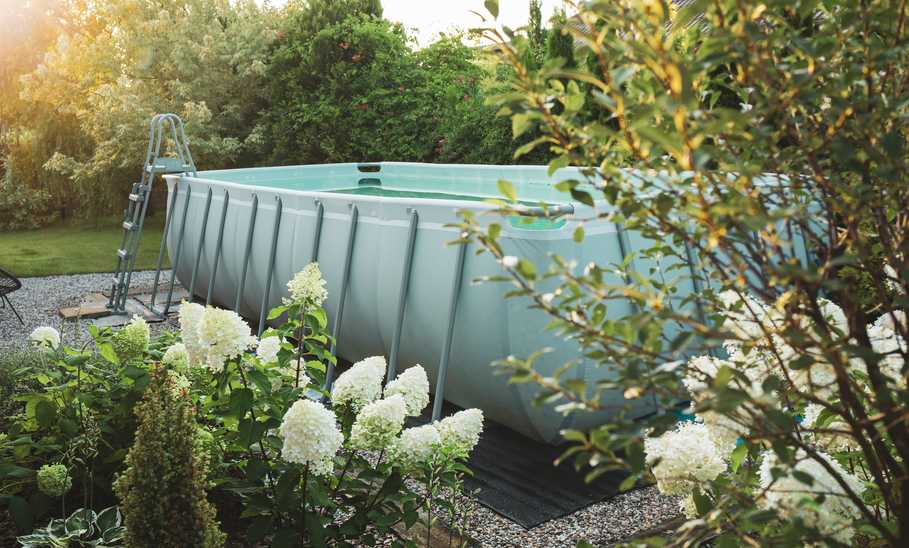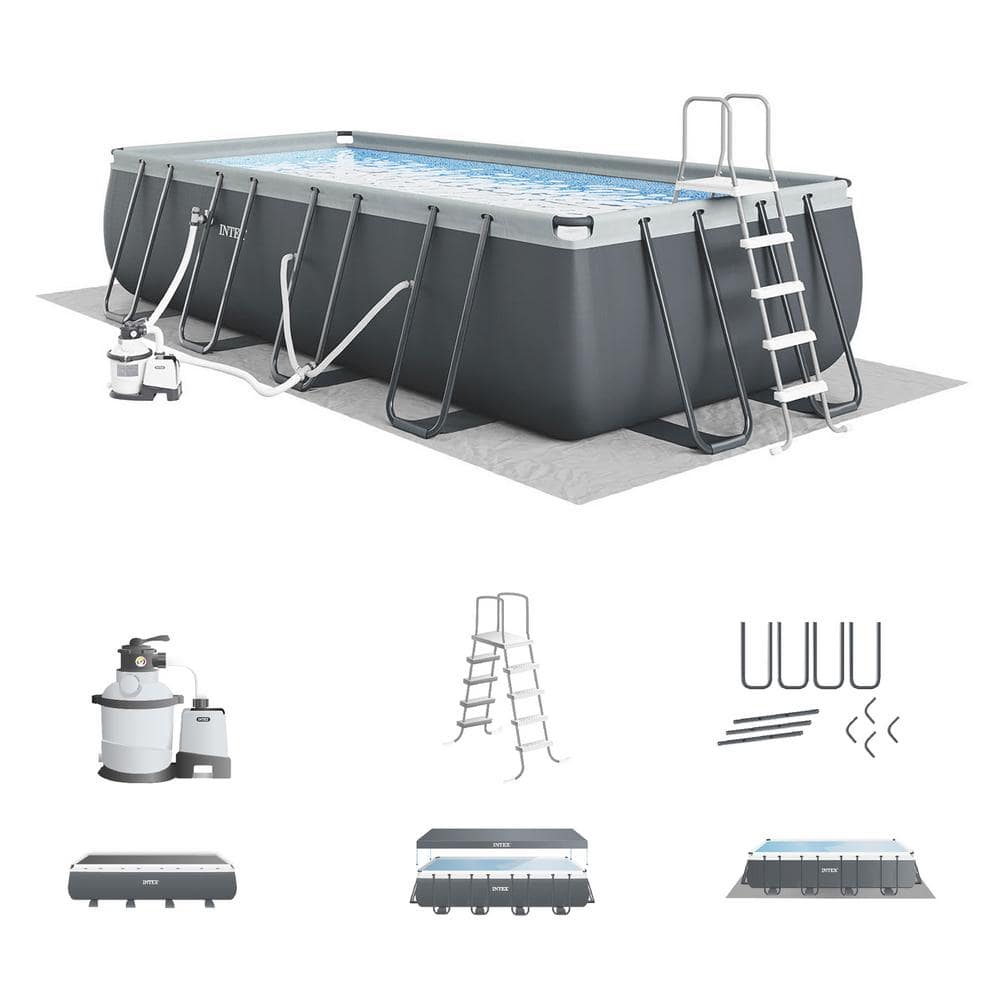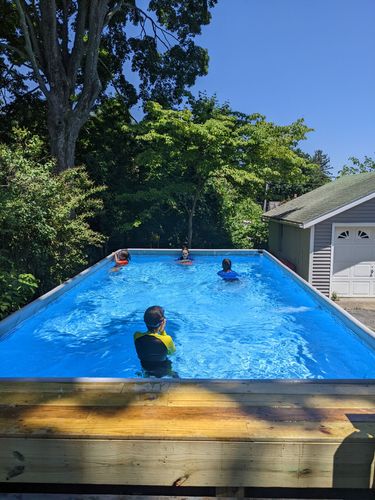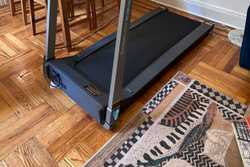- Capacity: 8,403 gallons (90% filled)
- Dimensions 24 feet x 12 feet x 52 inches
- Shape: Rectangular
- Price on publish: $1219.99
The 8 Best Above Ground Pools for Fun in the Sun


Our evaluations and opinions are not influenced by our advertising relationships, but we may earn a commission from our partners’ links. This content is created by TIME Stamped, under TIME’s direction and produced in accordance with TIME’s editorial guidelines and overseen by TIME’s editorial staff. Learn more about it.
One summer, my partner and I found a 16-foot square (an unusual size, now defunct, Intex style) pop-up pool in our basement that we had owned for years (it was a gift from a far-flung extended family member) but never set up. We were lucky enough to have just enough space in our small backyard to set it up, and that’s where we (and our young children) spent most of our time. We became instant converts to above ground pools and never looked back since our budget doesn’t allow for an in-ground one.
An above ground pool can provide hours of entertainment when it’s hot, and since it’s hard to heat them, maybe they can pull double duty as a DIY cold plunge. The pools I list are all temporary setups versus the larger above ground pools installed to stay up year-round.

I have the Intex Rectangular Ultra XTR Frame Swimming Pool in my backyard in the summertime, and we've owned both the 16-foot by 8-foot and 24-foot by 12-foot versions of the rectangular shape. However, you can purchase it in 18 feet or a whopping 32 feet plus a round version that is 14 feet across.
The Intex Rectangular Ultra XTR comes with a cloth ground cover, a pool cover, a sand filter pump (that we jettisoned for a compatible saltwater system), and a ladder, which we replaced with a sturdier option. Some of these pools are 48 inches deep; others are 52 inches. This pool does require site preparation because you need a level space clear of rocks, debris, sticks, and dirt. We place our pool on a smooth stone patio and still add flat pieces of foam to keep everything flat.
If you have enough flat space, this pool is relatively easy to put together (and disassemble) without a need for tools. It’s rust-resistant and has a durable three-ply-liner with an attractive pattern. Its sand filter pump has a flow rate of 1,600 gallons per hour, and while we choose to use a saltwater filtration system, the pump it comes with does its job, and we found the pool water stayed clear. It takes our family a few hours to set up with all hands on deck, but we love it because it’s big enough for kids and a couple of adults to enjoy. Our 24-foot version has held up for two summers.

This rectangular temporary pool is great for families who aren’t ready to commit to a year-round pool, but want one large enough to actually swim in.

My kids enjoyed a version of this pool many years ago and I’m happy to see it's still around. It comes in four sizes (we once owned an 8-foot version) and it’s easy to set up. This pool won’t overwhelm a small yard, and even the largest size is under $250. This pool doesn’t have a pump, so you have to clean it and toss in a floating chlorine dispenser to keep the water clear. It features a flow control valve for easy and quick draining of the pool water when not in use, and the set-up time is less than 30 minutes, as far as I recall.
The pool is durable for a budget option and is made from heavy-duty PVC and polyester three-ply side walls, providing a reliable, stable swimming pool for your kids (and you) to splash around in. Also, the sides are only 23 to 33 inches high, making it easy to get in and out of the pool. We used a step stool to help smaller kids get in and out.
A durable and affordable option from a high-quality brand for a small family that just wants a pool to play and relax in.

Another winner from Intex. My friend owns a smaller version of a pool from this company and also introduced me to a Facebook Group for Intex Pool Owners. This round version of the Intex Ultra XTR Frame Pool is relatively easy to set up and take down, although you'll need a couple people for the job. The powder coated, rust-resistant steel support beams connect via durable T-joints and are easy to disconnect by pressing a button at the joint to release it and remove the pieces of the frame.
While this pool is considerably cheaper than the rectangular shape, it still comes with similar accessories, like a pool cover, ground cloth, removable ladder, and a sand filter pump. Depending on your space, there are a few sizes to choose from, including this 20 feet by 48 inches and one that’s 14 feet by 42 inches.
A large circular pool with an attractive liner that can fit several kids at a time for under $1000.
If you have toddlers or babies and just need a place to cool off with them, this cute 5.5-foot wide blowup three-ring pool from Minnidip will fit in a small space with just enough room for a couple of wee ones and an adult. It’s pretty enough to add style to your outdoor space in the summertime (or year-round depending on where you live).
This pool inflates in minutes using a standard air pump (or even a hair dryer on the cold setting!), and each ring of the pool has its double valve for easy inflating and deflating. I love the colors on this Minnidip pool, but there are many variations, including lemons, bright flowers, and a watermelon Minnidip I bought in the summer of 2020 for my younger child. (Shopping tip: Minnidip also made our list of the best inflatable pools+7.)
The pools are made of PVC vinyl, so don’t leave them out in the sun for months on end. Plus, you'll need to fill and dump the water as you use it. These aspects may have slight downsides, but for such a pretty pool that easily fits on a small porch or patio, I love this option for cooling down with your kids in a pool made for lounging, splashing, and playing.
If you’re looking for an alternative to a plastic round kiddie pool, this three-ring inflatable is stylish and durable, plus it’s easy to set up.

I first tried an older version of this pool at a friend’s house who spent her childhood in homemade swimming pools made from extra-large trash bags and bins filled with hose water. While I admire her youthful ingenuity, this is a better option. At 18 feet wide, this easy-to-set-up inflatable pool is large enough for up to four kids and an adult or two to swim and splash around in. Pool basketball will work well in this, too. You’ll need a flat space (most above ground pools do) and a strong air pump (compressor), but it comes with a ground cloth, a 1500-gallon-per-hour filter pump, a ladder, and six filter cartridges.
Personally, I would purchase a heavier ground cloth and anchor the ladder or choose a more sturdy one if you have wet bodies climbing in and out. This pool is 48 inches deep, so it's only recommended for kids who can stand with their heads above four feet and have strong swimming skills.
An affordable inflatable pool that’s big enough for several older kids or adults to have fun in the sun.

This is the same pool I voted as the “all-around best” option, but is slightly bigger and comes with a saltwater system. My family uses a saltwater system with our small Intex, but if we had the space and funds, I’d upgrade to this larger model. When you use a saltwater system, you cut down on the amount of chemicals, and the water (in my opinion) feels better on your skin than an all-chlorine pool. You'll need adequate level space to pop up a 32-foot by 16-foot pool, but this is as close to a “real pool,” as my kids call it, as you can get with a temporary free-standing one. It's a great upgrade when you’re ready for one.
A salt-water system in an above ground pool big enough to swim laps in for under $2000? Sign us up.

This steel pro round above ground pool that measures 15 feet wide and is deep enough at 48 inches. Plus, it’s less than $300 at The Home Depot. You’ll need to pay for a filtration pump (check out saltwater systems, even for small pools) and a ladder, but this is an easy set-up that doesn’t take up as much space as its larger counterparts. You can use a garden hose to connect with the pool’s built-in control valve to easily fill and drain your pool water.
An expensive but durable pool that is easy to set up and take down.

This option is made from heavy-gauge PVC and reinforced with polyester mesh that is soft-sided and designed to look like rattan material. It comes with a frame ladder, pool cover, and filter, so you don’t have to buy anything extra to get it up and running. At 24 feet wide, it's big enough to fit several kids or adults comfortably.
Another accessory that makes this option stand out is the included standard maintenance kit with a three-piece 12-foot telescoping pole, leaf skimmer, 1.5-foot x 30-foot vacuum hose, vinyl liner vacuum head, 18-inch standard nylon wall brush, and (50) 3-in-1 test strips, to make sure the water is clean and safe to swim in. You’ll just need to add some pool toys.
This is an extremely durable above ground pool that comes with a maintenance kit, ladder, filter, and ground cover.
Before you purchase an above ground pool, measure the space where it will go and then add a few feet around it for set-up (we added three feet on each side for our largest one). You can find temporary above ground pools as long as 32 feet. Most depths are 48 to 52 inches. The size usually depends on the shape of the pool.
Most temporary swimming pools are either a circle, oval, or rectangle. Round pools are often easy to find and come in most sizes within the category shape. Rectangular pools (my personal favorite) can be purchased in a large enough size for at least some members of your family to actually swim in. In my experience, round pools work best for hanging out and cooling off.
Where you decide to set up your pool may determine the shape of your purchase. For example, it may be more difficult to find a suitable space to accommodate a large round pool versus a rectangular one that could sit against a deck if you have one. You can find oval above ground pools, but they’re not as common as the other two shapes.
It took my partner, myself, and our kids a few hours to set up our last pool, which was rectangular and 24 feet long. Small temporary above ground pools can be as easy as putting them on a flat surface, and speaking of surfaces, all temporary pools need a level and even ground for set up. When our kids were young, the hardest part of setting up a small kiddie pool was leveling the ground underneath it.
Depending on the type of pool, some will last longer than others. Inflatable swimming pools usually last a summer season or two before springing a leak. Some top-quality above ground pools from reputable brands (see list below) could last years if you properly care for them.
It’s important, even if you have a filter system on your above ground pool, that you test the water balance, keep it clean, and add any necessary chlorine, salt, or chemicals depending on the make and model of your pool. Nothing is worse than waking up to a green or discolored pool. You need balanced pool water that won’t hurt or irritate your skin or cause potential illness due to insufficient chlorine or too high pH levels. And make sure you have the time and energy to keep your water free of debris like leaves and twigs. Smaller pools have easier upkeep than larger pools, so purchase one you have time to care for instead of allowing it to become a mosquito magnet of stagnant, unhealthy water.
When you buy an above ground pool of a certain size, at least the ones on my list, you’ll usually receive a kit as part of the package, which contains a filter pump, ground cover, pool liner, and a top cover to keep out debris.
Most pools, but not all, don’t come with a ladder, so you'll usually need to purchase one separately. You may also need to purchase a few additional items like a pool net to scoop out bugs (or frogs), cleaning supplies, and other products to keep your pool in tip-top condition, whether you are swimming or splashing around.
Pro tip: I purchased salt-water filters for two of the four above ground pools we've owned (instead of using what a kit contained), and we’ve never looked back.
Most towns and villages have rules regarding swimming pools, even temporary ones. Make sure your swimming pool follows the safety codes and get a permit if necessary. Some typical codes may require pools to be a minimum of three to five feet from a rear and side property line and 10 feet from a street or road. You may also need to put in a fence.
Call your local building inspector’s office to find out what’s required to put up a pool. Also, if you have a pool that takes 5,000 gallons of water or more, you'll likely need to purchase your pool water to be trucked in versus a couple hundred gallons (or less) for a blow-up kiddie pool that can be filled with a garden hose.
When it comes to above ground pools, there are many choices in size, style, and budget.
This kind of pool is usually extremely easy to set up and take down, simple to maintain, and is usually the most affordable option if you’re on a budget. Inflatables need air pumps, which are sometimes included with the pool, and their valves make them easy to deflate at the end of the swimming season. Some inflatables need filters, others, mainly kiddie pools, do not. These pools might not last more than one summer, but they are convenient and excellent space savers for a small deck or backyard. Make sure your garden hose is nearby for refreshing and adding to the pool when water gets sloshed out.
Resin-frame pools are made of ultra-durable plastics, which make them lighter and easier to maneuver for set-up. These pools don't heat up like steel and do fine in the hot sun. Resin pools may be more expensive than steel pools, although resin pools often have steel components and are called hybrids.
Most steel-frame pools will last much longer than inflatable options, and they come in multiple sizes so you can pick the best one for your space. Most are made from rust-resistant supports with a rigid frame, including side rails and vertical struts. Some steel-frame pools have PVC or vinyl side walls and take time and effort to assemble — even when the pool has a simple design. You'll need an extremely flat surface and solid ground so the frame stays level.
These pools are usually installed by professionals and are buried partially in the ground or built into a deck. Unlike temporary pools, these remain in your yard and can last decades if you take good care of them. It may be possible to use an Intex or other above ground pool, but it's highly recommended that you consult a professional before you try.
You can turn many above ground pools into saltwater pools by adding a salt chlorinator system — that's what I do with my pool. You add your own pool salt and the saltwater system converts it to chlorine to keep your pool clean and sterilized. The water has fewer chemicals and feels softer, and so does your skin after a swim. Like all pools, you'll have to use a pool test kit to regularly check water quality and add more salt when needed.
If you are or want to be a pool owner (from kiddie pool to inground swim oasis), keeping family members safe must be a priority. According to the National Drowning Prevention Alliance, there are five layers of protection to keep your kids and others safe:
Even if you have a shallow pool, it's critical to take steps to keep everyone safe.
Start with a flat surface, clear of debris—no rocks, dirt, sticks, or other items should be under the pool. Don’t set up on top of tree roots or too close to power lines—check your town’s codes for how far it should be from your and others’ properties. If you don’t have a level and even surface, your pool could potentially sag, lose water, or, in the worst-case scenario, a side could collapse.
I find laying out all the materials and grouping them in the order the pool is to be put together is useful, so you aren’t scrambling for a piece you need while trying to hold up part of the pool. Make sure to put the ground cloth or ground materials down first, then lay the pool liner on top.
Follow the pool's directions, and don't take any shortcuts during set-up. Most of these pools have PVC walls and steel or resin frames that connect together, and you'll need to make sure everything lines up, or you'll have to redo it.
If you can afford to, or your pool is very large, opt for purchasing pool water. It takes a short time to fill versus a hose, so you’re not wasting municipal water. Some towns and villages have rules about filling pools, so check first.
If your pool comes with a sand or saltwater filtration system, ensure it's operating correctly and test your pool water (we test ours daily) to ensure the water is healthy. You can use most of the same pool cleaners that you would with an in-ground pool—we have a floating chlorine dispenser in ours. Use a skimmer (a pool net) to remove leaves and bugs (and, in our case, once, frogs) from the pool, and cover your pool at night or when not in use. Make sure to test and treat the water to ensure it stays balanced, healthy, and safe to swim in.
You can use a hand-held pool vacuum that attaches to a skimmer or purchase a robotic one, like this cordless automatic. Some pool vacuum cleaners attach to the hose connecting to the filter. And make sure to backwash your filter after vacuuming your swimming pool so you don’t transfer debris.
I researched top brands like Bestway, Summer Waves, Intex, and others to evaluate how easy the pools are to assemble, the variation in sizes, the durability of the materials, the enjoyment of the swimmers, and the best value for budgets.
I reviewed several sizes of pools in a range of materials, including steel, plastic, inflatable, and others. I considered how a pool might fit in many types of yards—from small patios to larger suburban tracts of land—and the best sizes and shapes for small and large groups.
I spoke to friends and colleagues about the above ground pools they have owned or enjoyed, and I personally have tested several on the list in my own and others' backyards.
It depends on the pool you purchase. An inflatable or hard-shell small kiddie pool could cost less than $40, and some can run $3000 or more.
It depends on your space and budget.
Steel or steel and resin hybrid pools are often considered the most durable. A semi-inground pool will last the longest because they are usually professionally installed.
Steel-enforced pools will be tougher than an inflatable pool, but all above ground pool liners can be susceptible to punctures.
It depends on where you live and the climate and weather. Most above ground pools are not meant for harsh winter weather, although a semi-inground or a commercial-grade above ground pool meant to stay put rather than be temporary, like the ones on my list, can be left up year-round.
National requirements require swimming pools to be at least 10 feet from house walls. Check your local codes regarding temporary pools for additional setback requirements.
The information presented here is created by TIME Stamped and overseen by TIME editorial staff. To learn more, see our About Us page.



